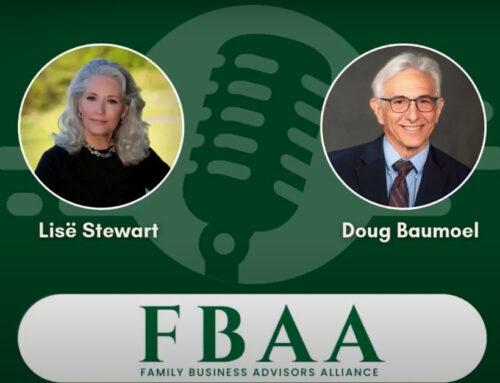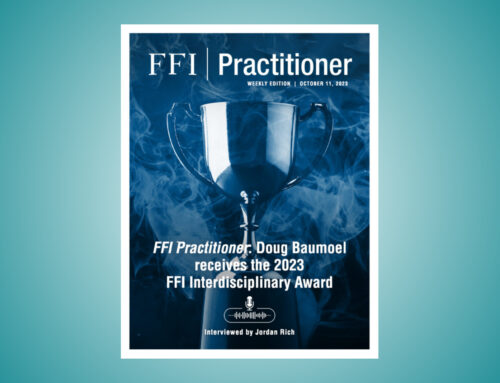Conflict is a normal part of family life. But it can be difficult to talk about and to manage, especially when significant wealth or a family business is involved. Blair Trippe is a counselor who has years of experience working with families in conflict. In this podcast Blair defines the different types of conflict, shares strategies for dealing with different forms of conflict, and talks about measuring the “family factor” needed to help families weather the usual slings and arrows that fortune sends their way.
Man: Welcome to the “Wealth of Wisdom Podcast.” This show is an audio companion to the book “Wealth of Wisdom: The Top 50 Questions Wealthy Families Ask,” written by Tom McCullough and Keith Whitaker. The book features insights from more than 50 of the top thinkers and practitioners in the family wealth field. These are the questions your family should be asking. Here’s your host, Keith Whitaker.
Keith: Hi, I’m Keith Whitaker. And I’d like to welcome you to this “Wealth of Wisdom Podcast.” Episodes of this podcast are an audio companion to the new book, “Wealth of Wisdom: The Top 50 Questions Wealthy Families Ask,” co-authored by myself and Tom McCullough. Now, for this episode, I’m speaking here in Cambridge, Massachusetts with Blair Trippe. Blair authored a chapter responding to the question, how can you best manage conflict in your family? This is obviously a hugely important topic. Blair is a managing partner of Continuity Family Business Consulting. She also co-authored with Doug Baumoel the book “Deconstructing Conflict: Understanding Family Business, Shared Wealth and Power.” So thank you for joining this podcast, and welcome, Blair.
Blair: Thanks, Keith.
Keith: So, Blair, I’d like to just start actually with you, and maybe you could tell us a little bit about what it is you do and how you got into this field of family business and especially dealing with conflict?
Blair: I had a very circuitous route into this field. I started out studying psychology undergraduate in college, after having worked summers in that field then, and preparing to have a psychological career. Decided against pursuing that and instead went to business school, where I learned other things. And went on to Wall Street for a couple of years, just to see what that was like. It wasn’t the right fit. So I ended up…I moved to Boston. And I was on the launch team of a startup. So I got a real sense of business and how business works and sort of the pros and cons of this versus that type of structure. And following that, I had 2 children, 14 months apart. So the startup life didn’t really work out so well. And I took some time off, went back to school for conflict resolution, the thinking being I could help families who are battling each other on estate disputes, to find a better way than going to court.
I ended up starting mediation from that, did some of that work, but really primarily focused on adult siblings who are not aligned with each other on issues regarding their aging parents. So how can they share caregiving or share the vacation home? How do you take the keys, the car keys away from a parent who really shouldn’t be driving, those sorts of things. And then wanted to get into a position where I could really add my business background to the adult family dynamics and conflict resolution, and got involved in family business.
Keith: Wow. So you had a circuitous route, like many of us in this field. It sounds like actually, the starting point for you wasn’t wealth or business. It was really helping family members, siblings, parents, children deal with conflict. I mean, that was really…
Blair: Yes.
Keith: …at the core for you. Uh-huh. And that’s an area that I think a lot of people shy away from. So was it attractive to you to get engaged with families around those kind of things?
Blair: You know, I think my early background just in working with individuals who are struggling with a variety of things, that was really my first love, was how do you help people make a better situation out of whatever it is that they have? And I had a couple friends whose families were having real issues regarding estate settlement, and it was tearing them apart. And since I knew them and I cared about them, I started being, you know, an untrained mediator, but trying to help them come up with better ways and really think through what was going on and really what was important to them. And how could they get from where they were entrenched in a difficult, very complicated type of conflict to a better place and still remain family.
Keith: Mm-hmm, wonderful. So this area of conflict and families, I would imagine, is one of those areas where there’s a lot of misconceptions, a lot of myths, a lot of stories. I mean, practically every novel or movie that involves families involves some sort of conflict, and there’s many iconic ones like King Lear and the like. So, are there myths that you can help separate from the reality or is what we see on TV or in novels, that’s pretty accurate?
Blair: You know, I think the themes are pretty accurate. I think that there’s really no way to get away from some type of conflict in a family, let alone a family that shares assets. It’s really built into the structure of family enterprise because people are interdependent in a variety of different ways. And it’s very difficult for them to separate specific issues from the greater systemic whole.
Keith: So that reality of conflict is a reality. And what do you think makes it so difficult for people to deal with it, given that it is a reality part of life?
Blair: Well, I think people recognize that family relationships are uniquely permanent, and you can’t just decide, “I’m not going to be your sister anymore.” You can choose to not speak to your sister anymore or not speak to your parent, but you’re still family, and I think that that’s something that stays with you regardless of what happens. I also think that people, you know, end up saying, “Well, this is just a dysfunctional family.” And I always, you know, rail against that concept because families are all individual and they function in very different ways. And dysfunctional means that you do not function, but anybody who is in a family and part of it, struggling to move forward in a variety of ways, has a lot of hurdles to get over. And it’s not a dysfunction that they’re having trouble with it, it’s just the way it is. Because as I said, they’re interdependent, they have different roles, they have different needs, they have different motivations. And how do you come up with a situation where you can figure out a path to resolve or move forward from an individual situation within the context of the greater whole?
Keith: So it sounds like one of the things you’re saying is that it would be important or helpful for families to watch out for the labeling, labeling themselves dysfunctional, or like that the word conflict allows people to not assign that label but still acknowledge a certain reality of family life.
Blair: Yes.
Keith: That is helpful. Because again, I see it in my own practice of speaking, that families will almost be embarrassed to admit conflicts. And so, for fear of being labeled or labeling themselves, judging themselves or thinking that there’s something wrong with them. And I think what you’re saying is that, in fact, it’s not wrong. It’s perfectly normal and expected that there would be conflicts in these permanent, deeply powerful relationships, which also in these cases involve money or business.
Blair: Absolutely. And conflicts takes a variety of forms. And it doesn’t mean that people are actively screaming and yelling and having a food fight. It rather means or it can mean that they have issues that they just choose not to deal with, and so they keep them under wraps. They don’t talk about them. And they assume that they get along fine because they’re not fighting. That passive conflict, however, is quite insidious, and can lead to just, you know, further, further schisms between different parts of the family because there are issues that just aren’t discussed, and they really don’t go away.
Keith: Yeah, this sounds pretty familiar to me, just as we’ve come off of thanksgiving, where you’re not supposed to talk about any of those things.
Blair: This is true. This is true. Norman Rockwell really doesn’t exist.
Keith: Right. Right. So well, on that note on, what you’re going to is defining what conflict is maybe you could say a little bit about the chapter for anybody who hasn’t read it yet. Kind of sort of some of the main points around defining conflict and what families can do about it.
Blair: Well, I would say there are three basic reasons that all conflicts exist. And I think whether it’s a family conflict or a conflict with a neighbor or within your company or, you know, any type of conflict falls into three essential buckets. One is that people have opposing goals. And that’s not just different goals, these are goals that are an opposition and cannot be satisfied within the given time period or the given resources available. They have incompatible values, and again, not different values, but values that really cannot coexist at the same time. People cannot work together if they really can’t deal with some of their values, what’s important to them, who they are, how they see themselves.
The third are the historical impasses that families have. So what is the baggage that families bring with them to the table and that keeps them, blocks them from having conversations or being civil to each other because these are the buttons. We say that family members are just masters at pushing buttons. Essentially, they installed them and they know where they are and they know how to trigger them. So if you think about the reasons for the various conflicts and you look at them as incompatible values or opposing goals or baggage, you can live fine that way. Families often silo up or just it’s that passive conflict I was speaking about earlier, where they just choose not to deal with certain things. And they can be fine until there is a trigger that really ignites a level of active conflict, and that trigger is disrespected power.
So when one individual or group of individuals exerts power over others in a way that is not considered respected, that then will trigger an active conflict. And so I think we all sort of see that, and you refer to Thanksgiving, at the Thanksgiving table and everybody’s sitting there, getting along okay, until somebody throws a grenade and then it blows up. And I think that’s what happens. And I think if you think about any family conflict, and you break it into the components of, you know, the goals, the values, and the background, and then see what sets it off. It’s pretty, you know, clear to map out really what’s going on.
Keith: Mm-hmm. That’s a great way of kind of dissecting it there and taking something that can feel not only really confusing, but very highly charged and separating out the threads of what’s going on. One question on that, when you talk about disrespected power, who’s doing the respecting or the disrespecting? Is that the person who throws the grenade or is it the people who respond to the grenade throwing? Or is it somehow both?
Blair: You know, it’s both, it’s a cause and effect. So I would say that everybody has power of some kind. Sometimes it’s the power of the purse strings. Sometimes it’s the power of the moral authority or the head of the family or, you know, anything. A contract that keeps people, you know, locked together in a trust agreement or something. There’s lots of different power that people have that they can use to get what they want. How they use it is going to really make the difference between whether a fight begins or not, and how they are viewed by others will have a great effect on whether something, you know, rises to that level.
Keith: I would imagine that one step in managing conflict would be doing just what you were saying, of diagnosing, analyzing what’s going on, just getting a sense of those three factors and causing the conflict, being aware of the trigger and such. Let’s say that a family has started to do that. They’ve started to analyze and understand, what else can a family do to manage these conflicts given their power?
Blair: Well, I think if you think about the traditional ways that people approach managing conflict, the knee jerk reaction is force, which is, “I’m gonna sue you, I’m going to retaliate, I’m going to vote you out, I’m going to fire you,” things that I can do that are force. The second way that people generally think about managing conflict is a bargaining approach, which is, you know, negotiation, we’re just going to negotiate and come up with a compromise or we’ll mediate, which is assisted negotiation, essentially. You get a third party to help you negotiate something.
These approaches can work for certain things. But if you’re looking at the components, force and bargaining will be able to address opposing goals. You can negotiate a salary, you can bargain, you know, for certain behavioral changes to move a goal one direction or the other. But they don’t really attend to issues of incompatible values or historical impasses, which really are the things that typically are at play in the families that we work with who are experiencing conflict. So if you can’t bargain with somebody to like you, you cannot negotiate how, you know, you’re going to take my view on a political issue, for example. These are not negotiable or issues that respond to force. So in those situations, you have to take what we call a development approach. And we look at structures and we look at people. So you’ll have structural development and you’ll have personal development.
So structural development deals with the institutions or the organizations in which the family members are involved, and personal obviously are personal. So structurally, you might put into play processes or procedures for how things are done, or career paths if it’s a family business comp, policies, etc. Whereas on a personal level, you might be looking at how do you develop empathy, how do you learn how to change your tone when you speak to people? There are things that respond very well to coaching, education to understand maybe how to do your job better, and how to really understand what’s going on with the other people.
Keith: Again, that’s extremely helpful to think sorting out the different responses to the different causes of conflict. So if we were to take an example, I think on more of the development type of response, like one thing that I see very commonly in families is conflict over the inclusion of or involvement of spouses in the family business or in the family wealth, even just knowing about things about the family businesses, family wealth, or being invited to certain events and such.
And you can really see how there could be different values on each side of inclusion or exclusion. You can also see in families the historical baggage that might come from divorces or other experiences with spouses or ex-spouses that would shape members’ views. So in that kind of scenario, which I think is pretty common in families with businesses or wealth, what are some of the ways that you’ve helped people address that question of what to do about spouses, significant others, etc., in-laws, outlaws and such?
Blair: Well, you know, I would say in-laws can be the most unifying or the most polarizing members of families. Typically, I would always opt to include people in a conversation. I think you’re not saying you have a vote or you have power, but you’re saying you have a voice at the table. And so even if the in-laws are not experts in the business, or they’re not experts in the trust agreements, they are experts in the family, and they bring a perspective that generally is more objective because they can look at things, you know, with a different frame. So I think letting them have a voice and structuring how that voice is heard is, I would say, quite important.
I also would say that pre-nups, you know, for in-laws should be a must in wealthy families. And it’s not using a fairness standard. I mean, sorry, it is using a fairness standard. It’s not using a protection standard for how am I gonna protect our family assets from this interloper, but rather what would be fair, you know, to this person whom I’m bringing into the family and maybe I’m gonna have children and have really brought into the fabric of the family? What would be fair to him or her should this not work out? And the work that we do with families is really understanding values around wealth, perceptions of wealth, what’s important, what sort of lifestyle do these individuals want to have? And what are the expectations that they have of each other within the context of wealth?
Through that, you can then think about on the other end if things don’t work out, what would be fair? I would suggest that by going through a process like that, you are less likely to be in the situation where you need to use that prenup.
Keith: Mm-hmm. That makes a lot of sense, although it is one of those topics that people really shy away from out of fear that if they even bring it up, it’s going to spark active conflict, it’s gonna get my marriage off on the wrong foot, it’s gonna lead to a divorce down the road. So all of that catastrophizing happens pretty quickly, as soon as one even brings up the topic of a prenup.
Blair: Well, again, it’s about power and how power is used, and how it’s delivered. We often say it’s not what you do, it’s how you do it. And we encourage next generation members of wealthy families to make sure that not on the first date, but somewhere along the beginning of the process, that it’s clear that this is part of the deal. And it doesn’t have to be let’s sit down and have a tough conversation, but you see a movie where there’s a divorce and you start talking about
“Gee, in this movie this and that.”
Just, you know, FYI, if we ever got serious, there would be a prenup involved, just so that’s part of the fabric of the relationship and the expectation is set. Obviously, if you bring it up, you know, six months into your engagement when the wedding is two months away, it’s not gonna go over well. So again, getting involved in a process. It’s a very useful process. And as I said, if you take the fairness standard, it’s generally well received.
Keith: So that’s really good advice for parents of adult children too, who may be very much interested in the idea of a prenup worried about possible absence of it, but who out of a lot of reasonable fears may procrastinate, even bringing it up until, as you said, two months before the wedding, which can obviously be pretty destructive. Do you find yourself, as I’m listening to talk about prenups, it makes me think about kind of a larger strategic question, do you find yourself ever having to precipitate not conflict but just even people getting to talk about the passive conflict or the possibility for conflict that’s out there, rather than stepping right into an active conflict situation? I mean, I think of that with prenups because a lot of people may not even be thinking about it, they may not know much about it, or what little they know causes them to be silent about it. And so you’re saying could be really helpful to actually get people talking about it, and going through this process. So do you find yourself ever having to kind of, I don’t know, give a little spark to the conflict to help people actually deal with it?
Blair: We like to raise the issues. All the work that I do is really within the, you know, with the lens of conflict management in the future. What are the unintended consequences that could occur? So I like to let families know that these are things that may happen, these are things that you might wanna guard against. These are things that you should be aware of. And even if you don’t like it, it doesn’t mean you shouldn’t attend to it. And the younger the next generation is, the better, you know, certainly as soon as they realize that they have access to money, and I know that’s an awful lot of the articles that are in your book, how that happens, etc. This, you know, the prenup piece could be a part of that conversation so that they’re well aware from the beginning.
Keith: Right. So raising awareness, this is, again, an important step in managing it. Because if you’re not aware of it, or you just feel like you can’t even talk about it, you’re certainly not gonna be managing it.
Blair: Exactly.
Keith: So then, you know, another question that I have thinking about experience with many families is that sometimes, at least in my experience, yeah, unfortunately, run into someone who’s just a real jerk, you know, and who is gonna throw those grenades no matter what, or is going to, you know, stir the pot behind the scenes, maybe has indifferent relationship to the truth. What do you do in those situations where the conflict may not be solely caused, of course, by such a person, but that kind of person is in the mix there?
Blair: Well, a lot of it deals with what is it that this family is trying to accomplish as a family unit? And how does this person align with that vision of being family in the future? Coaching can really help somebody understand how is my behavior affecting what I’m trying to achieve. And if it’s just a disagreeable person who’s unhappy and just wants to make trouble, it’s gonna be difficult to get that person to change.
And then you need to work with the family members to understand how they can react or not react to the grenades that are thrown. And maybe you end up in certain, you know, circumstances having to put in rules of engagement or ground rules for we’re gonna be having this dinner and this topic is not happening. And if this topic happens, we’re gonna finish dinner and go home. You know, every situation is going to be different. But there’s some people who have no ability to control what they say or what they do. And that’s coming up with strategies to manage that behavior.
Keith: Right, or perhaps they feel just fine doing what they’re doing and have no incentive to change.
Blair: Right.
Keith: So really, you would first attempt the personal approach to thinking about does this person have the capacity to change? Are there some ways you can help them be more mindful of themselves? Maybe think of the structural approach of connecting the dots and so forth. But being cognizant that maybe there is no solution to this person besides helping the healthy members of the system connect with each other. So I guess one of the things you’re saying is that there certainly is a place for humility in this work of managing conflict.
Blair: Absolutely, yes.
Keith: In dealing with family in general, I guess we could say. When you think about, you know, some of the families that you’ve worked with, are there other particular practices that you found very helpful? Or other examples of conflict? We talked a bit about, you know, prenups, involvement of spouses. Are there any other sort of…I don’t wanna call them red flags, because it’s pretty natural and normal, but, you know, other hot topics that come up repeatedly, that you found, you know, productive ways of approaching?
Blair: Well, what I would say, regardless of the red flags, and there are lots of different issues that can trigger conflict in a family. You know, I would say what we would consider in our practice the most important component of managing conflict we call the family factor. And that’s essentially the answer to the question is the family bond strong enough to leverage compromise, forgiveness, and commitment to change?
So essentially, is there a family bond that is strong enough so that individuals believe it’s worth doing the hard work to make change? It’s worth doing the hard work to forgive some of the transgressions of the past. There’s some shared history that we would lose if we go our separate ways. So how do you look at your family and understand how important is this to us? If the family is family and name only, or really only shares a collection of assets but not real interest in and being together, it’s very difficult to manage the conflict, because it’s going to be about the different goals and there’s no leverage there to say, “All right, I’m gonna compromise.” So for me, the red flag is when families really don’t care about each other. And that says to me, it’s gonna be much more challenging to manage conflict.
Keith: So then one of the key steps, it sounds like in your work or in family is work on themselves, would be a clear-sighted assessment of this family factor. Is it really there? Do we have this? Because if we don’t, then we could spend a lot of energy or spend a lot of money and go through a lot of pain, but it’s probably not gonna be productive.
Blair: Correct.
Keith: Uh-huh. So, are there instances where you’ve been, you know, asked by a family to help them out and you’ve done that assessment and basically said, “You know, I think that you guys need to pursue the path of going your separate ways”?
Blair: Yes, sometimes that does make sense. You know, my firm is called Continuity. We believe in continuing relationships. We believe that families, if they want, can transition from one generation to the next. But if there’s nothing there to work with, there’s no reason to believe that it’s a failure. If you separate it could make a lot of sense. So for example, if one branch has no real interest in being, you know, working within the same family office anymore, they have other things they wanna do. The question is, you know, what makes the most sense? What are the mechanisms that you have available to separate out? And then oftentimes, once they’ve separated out, they have a better ability to be family because it was the business or the assets and how they were managed, which created conflict. So sometimes, separating is a family conflict management vehicle.
Keith: So giving people some space actually can…give them space to reconnect in productive ways.
Blair: Yes, yeah. We work with lots of families that love each other, but scream and yell about business issues. And it makes for unpleasant conversations, unpleasant meals, unpleasant holidays. And if you take the business out of it, then the relationships can remain.
Keith: So I would imagine some of the really hard work there would be getting family members or maybe specific family members to let go of the dream of having this business or this business family or these shared entities, and recognizing that life might actually be better without those entanglements with each other.
Blair: Yeah. And sometimes it’s one generation that believes the family should always stay together and the next generation doesn’t. And so living the founder of the founders generations dream is really a nightmare for the ones who are put in the place of being told, “This is what you should do. Maybe you should, maybe you shouldn’t.”
Keith: Right. And again, there’s got to be somebody who’s holding on to that dream, that’s keeping the pieces together. And so really working with both those who would prefer to go separately, and those who are holding on to that dream would be essential to get them out of a stalemate.
Blair: Mm-hmm, exactly.
Keith: Yeah. So one of the things that you mentioned and talking about the family factor that I thought was really interesting in the chapter and also in the questions that you have at the end of the chapter, is the topic of forgiveness. And so I wanna make sure before we end it today to ask you about how do families forgive each other? How do you see that happening? What are ways that that really does happen? Because it sounds to me like one of those things that, of course, that should be part of life. Everybody makes mistakes, and so being able to forgive and the like is absolutely crucial, yet it seems so hard, especially in our families to do that.
Blair: Well, I think a lot of the transgressions that need to need forgiveness become myths and become out of place large schisms in the family. Others are much smaller. Sometimes in some of the families we deal with, what one family member has taken on as something that is unforgivable, and I will never speak to you, again, is something that the family member who perpetrated that is not even aware of what they did or what they said. Sometimes having a conversation about it works, but essentially there are four basic ways that I would suggest people to think about forgiveness, which is, on the one hand, it’s a choice. You can choose to forgive or you can choose not to. So if you recognize that you have an active role in deciding if you are going to forgive, I think that goes, you know, a long way.
I would also say that what we call cheap forgiveness is really not effective for me to say, “Okay, sorry, Keith, I’m sorry.” If I’m not, you can…you know, people are pretty astute and can judge a reasonable apology from just a made up, you know, cheap apology.
Keith: Right, or sorry to interrupt you, or the other side of just saying, “Oh yeah, whatever, it’s okay by me.”
Blair: Exactly.
Keith: Is a non-forgiveness forgiveness.
Blair: Exactly, and so that doesn’t work. The next two are dealing with more of a genuine approach. Real genuine forgiveness is when the two people who are involved in the issue will spend considerable time working through a process to acknowledge their contribution to the impasse and to hear the effects of the others. Some of the work that gets done in the restorative justice field where you really spend the time to understand the impact that whatever happened had on that individual and what your contribution is to it, you then would have a chance to say your side of the story, but it’s a process of going back and forth until there’s some genuine, clear understanding of what happened.
And the last type of forgiveness, we call acceptance, which is essentially, you’re in a position where the other person either is deceased, so they’re not there or they just don’t wanna participate in any sort of process. And you just have to work through, again, understanding your contribution to what happened, how it happened, and make, you know, get to peace with that. Some people use therapy to help get to, you know, to a level of peace there. But that’s, you know… So when we look at forgiveness, we look at those four different ways of what families can do, what an individual can do, and some of them are willing to go through a difficult process and some not and some don’t really need it. Sometimes once they’ve identified what the issue is, they can move forward.
Keith: Now, that’s very helpful. And I think especially that first point that the person doing the forgiving has an active role here is not only a passive victim of something done to him or her but has an active role in forgiving is especially important. And I’ve seen situations where whatever the act was happened long, long ago, and maybe the person who did it acknowledges what he did, and wants to achieve reconciliation, and it’s actually the other person, the, so to speak, victim who’s actively holding on to the resentment and the anger and such. And that that’s where the impasse lies, is that the perpetrator, so to speak, is asking for forgiveness and becomes very hard to move forward because the other person is not willing to activate that.
Blair: Right. It’s the typical perpetrator-victim model, and some people are professional victims and always want to be a victim. And I think if they realize that they have the power to choose to not be a victim and to forgive, and not hold that grudge, that they may sleep better at night.
Keith: Right, you know, recognize that the choice of holding on to the resentment, which is an active stance, may actually be an unhappier choice than saying, you know, “I forgive you and let’s really come to a different place here.” So, very important, again, I was certainly struck by the question at the end of your chapter asking about whether a family has or can ask forgiveness within the family is something that seems crucial to family life, but that’s something very hard to do.
Blair: Yes.
Keith: So before we close, is there anything else on this topic of managing conflict in families is that, one concluding message or piece of advice that you would like to leave listeners with as they turn eagerly to the chapter?
Blair: I guess I would say that conflict is really built in. And it’s not just a series of disputes that can be resolved. So I really distinguish between dispute resolution and conflict management. Conflict management is something that families, especially families who share assets, need to always be thinking about how can I manage this going forward? And how will the decisions that I make today, impact others in the future? And how do we build in mechanisms to have more clarity and transparency? And that’s what I would suggest.
Keith: Wonderful. Well, Blair, thank you so much for contributing a chapter on how can you best manage conflict in your family. Thank you for the time today, this podcast, we really appreciate it. And we look forward to listeners and readers, you know, applying these very important messages and give the right advice to their own family. So thank you again.
Blair: Thanks very much.
Man: Thank you for listening to this episode of the “Wealth of Wisdom Podcast” with Keith Whitaker. Visit us online at wealthofwisdombook.com, where you’ll find free downloadable preview chapters and audio interviews with several of the contributing authors.
Related Posts
About Us
Continuity Family Business Consulting is a leading advisory firm for enterprising families. Using a full suite of service capabilities, we help families prevent and manage the single greatest threat to family and business continuity: conflict. It is through this lens that we advise our clients and build customized strategies for succession planning, corporate governance, family governance, and more. We help families improve decision making, maximize potential and achieve continuity. To inquire, contact us.












